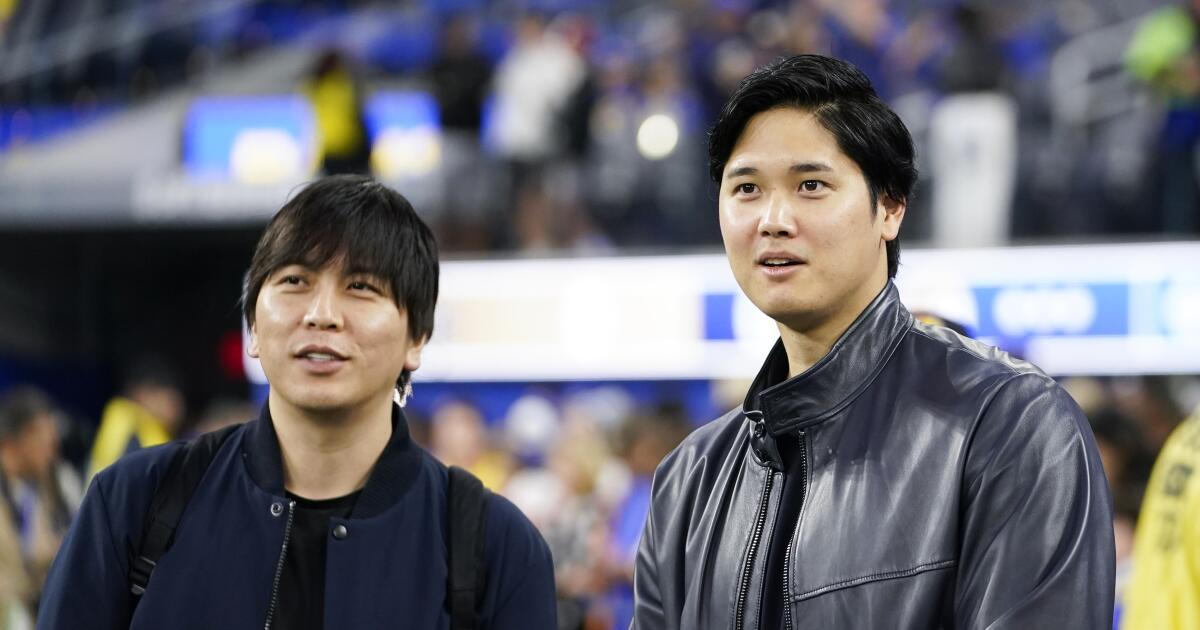Starz picks up drama on Shohei Ohtani’s former interpreter’s gambling
After 18 months of shopping the script, the proposed Lionsgate Television series based on the gambling scandal involving Dodgers superstar Shohei Ohtani’s interpreter is in development at Starz.
The project will spotlight the audacious theft by Ippei Mizuhara of $16 million from Ohtani to pay off staggering gambling debts. Mizuhara was fired by the Dodgers after the crimes came to light in March 2024. A year later, he was convicted of defrauding Ohtani in federal court and sentenced to 57 months in prison.
The series will be produced by Tony Award winner Scott Delman, known for “The Book of Mormon” and “A Raisin in the Sun,” and sports journalist Albert Chen. Alex Convery, who wrote “Air,” is on board as showrunner and screenwriter while Justin Lin (the “Fast and Furious” franchise) will direct, according to the Hollywood Reporter.
“This is Major League Baseball’s biggest sports gambling scandal since Pete Rose — and at its center is its biggest star, one that MLB has hitched its wagon on,” Chen said in a statement to The Times. “We’ll get to the heart of the story — a story of trust, betrayal and the trappings of wealth and fame.”
Lionsgate was having trouble selling the project to companies with media rights agreements with Major League Baseball — Disney, Warner Bros., Discovery, Apple, Netflix and Comcast — because the companies didn’t want to jeopardize their relationships with the league, according to the Hollywood Reporter. Lionsgate is the former parent company of Starz, but the two formally separated in May.
The story unquestionably is compelling. Mizuhara befriended Ohtani in Japan when the player who would become the most accomplished hitting and pitching combination in baseball history was an 18-year-old rookie with the Hokkaido Nippon-Ham Fighters.
Ohtani came to the United States in 2018 at age 23, signing with the Angels. Mizuhara soon became his most trusted friend and interpreter, serving as an intermediary between Ohtani and nearly everyone who spoke English, including the media, his agent and Angels officials.
Mizuhara arranged wire transfers from Ohtani’s bank account without the player’s knowledge or permission and impersonated him during more than two dozen phone calls with bank employees, all to feed a gambling habit that accumulated $40 million in losses across thousands of bets.
Mizuhara allegedly collected $142 million in winnings but lost about $183 million.
Ohtani signed a 10-year, $700-million contract with the Dodgers in December 2023 and the scandal came to light three months later. Ohtani was absolved of wrongdoing and described as a victim by federal authorities.
“Ippei has been stealing money from my account and has told lies,” Ohtani said through his new interpreter, Will Ireton, shortly after Mizuhara was arrested. “I never agreed to pay off the debt or make payments to the bookmaker.
“I’m just beyond shocked. It’s really hard to verbalize how I am feeling at this point.”
Ohtani quickly put the episode behind him, leading the Dodgers to World Series championships in 2024 and 2025. He was named National League Most Valuable Player both years.
